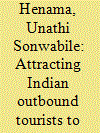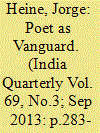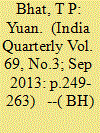| Srl | Item |
| 1 |
ID:
122643


|
|
|
|
|
| Publication |
2013.
|
| Summary/Abstract |
South Africa in the post-1994 era has experienced phenomenal growth in foreign tourism. The Tourism White Paper (1996) had noted that South Africa missed its tourism opportunity because of the country's troubled past. The rapid economic growth experienced by the BRICS countries has changed the face of international tourism. The tourism destinations have moved from developed to developing countries. In this context, the article highlights that South Africa enjoys 2.6 per cent of the lucrative Indian outbound tourism market. This market share has the potential to be increased. India has been added to South African Tourism's (SAT's) Core Markets List. A longitudinal analysis from foreign arrivals indicates two things, one, that India remains the top Asian foreign arrivals country, represented by 71,587 arrivals in 2010, and two, that India remains resilient to hold to its number one spot in Asian foreign arrivals to South Africa. South Africa must gear itself up to encourage the trend.
|
|
|
|
|
|
|
|
|
|
|
|
|
|
|
|
| 2 |
ID:
122646


|
|
|
|
|
| Publication |
2013.
|
| Summary/Abstract |
Immigration to Europe from Asia and Africa started soon after Second World War. The Muslims were the largest group among them. Those who arrived were looking for work and most were unskilled workers who were absorbed by the economy seriously short of manpower. The cultural and ethnic differences between the immigrants and mainstream society resulted in the anti-immigration forces expressing concern over such immigration. Till about the late 1970s, such concerns were expressed in racial/ethnic terms, but thereafter the emphasis shifted on the Muslims who were perceived to be asserting their communal identity as a separate group. In the 1980s and thenceforth more Muslims headed towards Europe seeking refuge on political and humanitarian grounds. After the 9/11 terrorist attacks and similar attacks in some European countries by Muslim extremists, the Muslim presence in Europe has been seen as subversive by some while others have described it as overreaction condemning a whole community for the crimes of a few. Security, human rights and minority rights arguments have been advanced for and against the Muslim presence. This study analyses such concerns in terms of notions of 'ethnic affinity' as a social construct.
|
|
|
|
|
|
|
|
|
|
|
|
|
|
|
|
| 3 |
ID:
122642


|
|
|
|
|
| Publication |
2013.
|
| Summary/Abstract |
War has existed from the beginning of human history and will continue in centuries to come even if all states accept democracy as their preferred form of government. The United States and India are both democracies and both have been involved in wars and conflicts since their inception as democracies. However, they face different threats and their responses to challenges have been different. Geopolitics, a country's status in the world, historical background and other factors shape a country's responses to crisis situations, and sometimes its democratic credentials play a very small role in this. America's superpower status and its objective of maintaining its unique position has often coloured its responses to security challenges. India is a comparatively new democracy, and its main concern till recently has been to maintain its territorial security. However, it is an 'emerging' country and is now seen as emerging as a global player. Will its changing status have an effect on its foreign policy responses?
|
|
|
|
|
|
|
|
|
|
|
|
|
|
|
|
| 4 |
ID:
122647


|
|
|
|
|
| Publication |
2013.
|
| Summary/Abstract |
Pablo Neruda has been described by some as the most widely read poet ever. His output was prodigious and diverse. He was also very much a man and a poet of his time, that of the first three-fourths of the 'short' twentieth century, a time very different from our own. That raises the question: Is it possible to split the poet from his politics? A standard recommendation of literary critics is to stick to Neruda's 'non-political' work and forget the rest. Yet, Neruda himself insisted that not only his poetry but also his personal life and his politics formed an indivisible whole. At a time when the rise of Asia and South America is changing the global landscape, it is especially important to come to terms with the central perspective that inspired Neruda's oeuvre: his identification with the common man and with the South; his anti-colonial spirit (honed during his Asian sojourn) and his extraordinary grasp of what José Martí referred as 'nuestra América'. This article explores how Neruda provides us with a vocabulary and a grammar that allows us to look at the emerging new world of the twenty-first century with fresh eyes.
|
|
|
|
|
|
|
|
|
|
|
|
|
|
|
|
| 5 |
ID:
122645


|
|
|
|
|
| Publication |
2013.
|
| Summary/Abstract |
The emergence of China as a powerhouse of the world economy has added a new dimension to the global currency market. China's impressive economic growth and phenomenal rise in exports have given considerable strength to its currency yuan in recent years. To what extent will China push to make the yuan the world's reserve currency has become a burning issue. Currently, the share of yuan in total world reserves is hardly 1 per cent. The reasons are obvious. The yuan is not fully convertible, the capital market is shallow, the exchange rate is not flexible and international acceptance of yuan as a store of value is non-existent. In the face of these constraints, China is showing an inclination to make the yuan an international currency and to rival the US dollar and euro. Increase in the inflow of foreign direct investment as well as outflow of investment abroad is enabling China to move towards internationalisation of yuan in the near future. Regionalisation of the yuan is gaining importance with rise in its international trade in Asia. China has now allowed the commercial banks in Hong Kong to accept the yuan-denominated deposits. It is further extending loans in yuan to developing countries. Many steps are being taken towards making the yuan an international reserve currency. At the outset, it appears that the yuan would become an international currency in the foreseeable future.
|
|
|
|
|
|
|
|
|
|
|
|
|
|
|
|